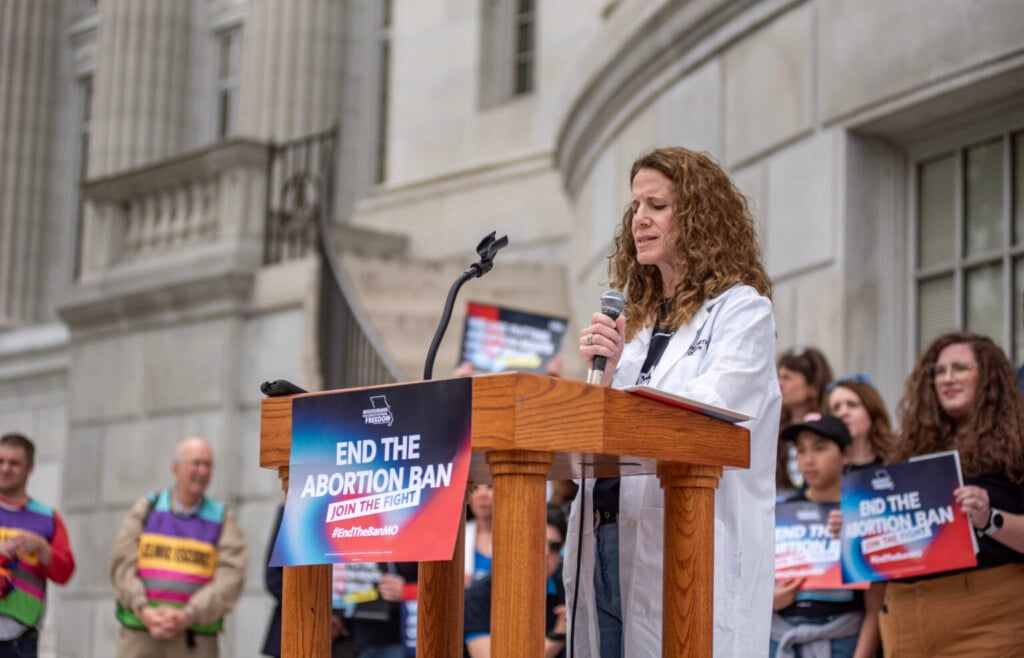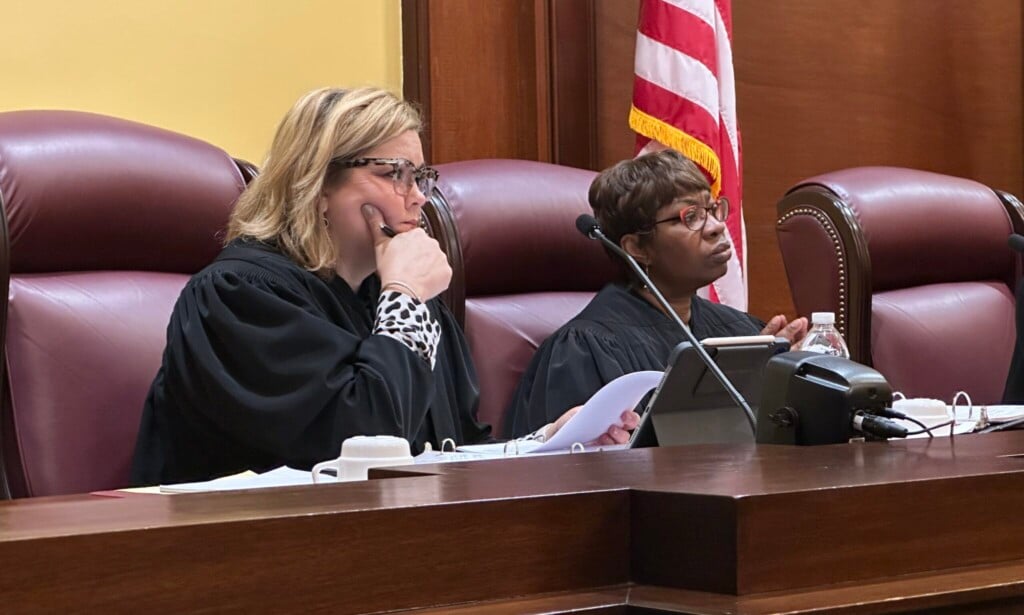Jackson County Prosecutor election features four divergent views for the future of justice, safety
As signs go up in yards and campaign texts blow up your phone, it is clear that election season has returned yet again. Though the country’s eyes remain on the deja vu-inducing presidential race, major positions are up for grabs locally. The Jackson County Prosecutor is a sneakily powerful gig, essentially representing the entire county in court. Whoever is elected will possess the power to decide who gets prosecuted for what, including abortion, drug charges, and, now, unhoused people’s very existence.
With Jean Peters Baker’s departure from the role after eight years, Kansas City finds itself on the horizon of change. KC has never had a black woman as city prosecutor, and three of the four candidates could break through that glass ceiling this year. Primary elections will be held on August 6, and the Republican party only has one candidate: Tracey Chappell. As for the Democratic side of the election, there are three potential runners: Melesa Johnson, John Gromowsky, and Stephanie Burton.
Melesa Johnson
Melesa Johnson—an Oak Park native with degrees from both Columbia University and UMKC—currently works as Public Safety Director in Mayor Quinton Lucas’s office. Johnson’s platform looks to further funding for COMBAT—the organization behind the anti-crime tax that works to fund preventative and community-based anti-crime programs. She also hopes to enhance rehabilitation, housing, and violence prevention programs. Johnson’s campaign targets property crime, which would get its own division under her term.
The unhoused population in Jackson County often becomes a hot spot for crime. With nowhere to go and dire conditions, these people may fall to breaking the law out of survival. Johnson recognizes this cycle, saying, “I am committed to leveraging COMBAT funds to focus more on making sure that we are deploying resources to make sure that we are eradicating houselessness.”
Johnson says she is committed to a minimum of $3 million for funding housing, financial literacy, job assistance, and mental health services to get unhoused people into better situations. “Pouring more resources into those arenas to make sure that we are tackling houselessness holistically,” Johnson says.
Johnson specifies the programs she’s eyeing to provide these services, like Rediscover, which helps those struggling with substance abuse. “I know a number of micro developers that are in the transitional housing game,” Johnson says. “We need to make sure that combat funds are easily allocated to individuals.” She also speaks about Reconciliation Services, which get people important legal paperwork, like IDs and birth certificates—both crucial to apply for jobs and housing.
Boots-to-gravel programs that work directly with the community to curb crime also have major support from Johnson. “We have amazing violence interrupters and intervention programs in our community,” Johnson says. “I’m talking about Casey on Corner. I’m talking about Lyric Institute. I’m talking about Aim for Peace. In many ways, they are really first responders in this space.”
“They’re going to crime scenes, doing street mediation, and reducing conflict in real-time without a bulletproof vest and without a gun. We have to make sure that we are paying more attention to them,” Johnson says.
Heavily invested in preventative programs, Johnson says, “We can’t just instill hope through a courthouse.” She speaks of the importance of representation and understanding as a means to ignite a sense of unity among Kansas Citians and law enforcement. “I’m talking about it as somebody who regularly goes to sleep to the sound of gunshots every night. The community will resonate with that. Especially communities that have been impacted by crime,” she says.
During her time working in the courtroom, Johnson says she was the one people called for to get witnesses to speak and work with the prosecutors. “I can sit down and not have a prosecutor-to-community conversation, I can have a community-to-community conversation,” she says.
Communities—specifically Black communities—have a difficult relationship with law enforcement. With a historical streak of police violence and mass incarceration that continues to this day, Johnson hopes to combat the biases and lack of connection between the prosecutors and the East Side of Kansas City. “I mean, let’s just be real about it. (Some prosecutors) only show up on the East Side when there’s a crime to investigate,” Johnson says. “But people don’t know you. People don’t trust you. People don’t have any level of familiarity with you.”
Johnson hopes to assign prosecutors to various neighborhoods throughout Jackson County. “Implicit bias training will continue under my administration so that our prosecutors can better communicate and relate to communities that they are not familiar with outside of the criminal legal system. But, implicit bias, we can take that a step further and actually do empathy training as well. Because you have people who do not have any connection to the urban core or to a neighborhood that is protected by a crime,” Johnson says.
Abortion is a major topic that will most likely be on most Missourians’ minds during this election cycle. When asked if she would prosecute abortion, Johnson says, “Under my administration, we will not be prosecuting women or providers under the current abortion ban.” One of Johnson’s endorsements is from Planned Parenthood Great Plains, and she has been steadily vocal about reproductive justice.
In response to Gromowsky’s take on abortion from a debate covered by The Kansas City Star, Johnson says, “My thing is, if there’s concurrent jurisdiction, the AG already has the ability to intervene. So we’re not protecting anybody from the AG, especially an AG who is not shy or bashful of inserting himself or his office into matters that he deems appropriate. And so if the AG wants to get involved, he will already get involved. As a prosecutor, as a woman, and as a woman who has taken advantage of reproductive care and who knows plenty of people who have, I refuse to play any role in injecting a criminal legal system into a woman’s right and autonomy to choose what to do with her body.”
When asked what separates her from the other Democratic nominees, Johnson says, “The emphasis on deploying programs and resources is a fairly new development for Ms. Burton. And I think what sets me apart is I have been consistent since day one.” Johnson has the most experience in political and building programs outside of the law.
“We talk a lot about, again, the acts that need to be taken within the confines of a courthouse, but none of my opponents, John Gromowsky included, has ever built a programmatic effort from the ground up. I have with Partners for Peace and I’m participating in the implementation of Save KC,” Johnson says.
“Yes, we’re going to hold people accountable,” she says. “We’re going to handle business inside of the courthouse. But it’s not enough to be tough on crime. We have to be smart on crime.”
“He (Gromowsky) pretty much had no longstanding relationship with communities that were impacted by crime. I mean, it wasn’t until very recently that I saw any yard sign of his east of Troost,” Johnson says. “And that indicates to me that he has been running a campaign as if he doesn’t need the people most impacted, and that’s concerning because if he’s not showing up now, I don’t know why he would show up when he is elected.”
Johnson says, “And at a forum, he even mentioned, ‘Well if the community doesn’t trust the police department, they should just trust me.’ And I naturally have to ask, ‘Well, why would any community of color, heavily impacted by crime, trust you to do anything when they don’t know you?’ John loves to diagnose the issue, which I get, but you don’t have to tell me how bad things are. I live in it,” Johnson says.
John Gromowsky
John Gromowsky differs greatly from the three other candidates—a white male with an Army background. His experience includes Jackson County Drug Task Force Prosecutor, the KCPD Central Patrol Division Community Prosecutor, and his current role as an attorney in the Violent Crimes Unit.
“What we do know from the various studies is that for us to drive down crime most effectively, we need to have swift justice,” Gromowsky says. “We need to have certain justice and we need, where appropriate, to have sanctions that are severe for violent crimes.”
His stance is that the administrative side of the job needs to be more prompt. The study he refers to is the Swift & Sure Sanctions Enhancement and Research Project, which says, “The SCF Program (Swift, Certain, and Fair Supervision Program) seeks to reduce the number of crimes committed by those under probation and parole supervision, which would in turn reduce crime, decrease admissions to prisons and jails (in a safe, responsible manner), and save taxpayer dollars.”
Another aspect of his policy is smoother police partnership. “For the past few years, there’s been a level of dysfunction that’s been broadcast out into the community,” he says. “If we’re doing something wrong, they need to be able to come to me and say, ‘Hey, you’re screwing this up.’ And I need to be able to accept that kind of criticism. But, I accept the same thing from them when I go to them and say, ‘Hey, you could sure make this a lot easier for all of us if you were to do something this way.’”
He believes that the KCPD and law enforcement’s flaws and defectiveness being brought to the public’s attention immediately is harming the prosecuting process. “Those kinds of conversations in the first instance must be had behind closed doors because that’s what good partners do. We don’t go out into the public and broadcast any sort of dysfunction. And the reason that’s important is because if a community doesn’t trust our criminal justice system, then we’re lost,” Gromowsky says.
He claims that the KCPD’s bad image prevents victims and witnesses from coming forward or reporting crimes, as they may feel as if they’re putting themselves in danger by interacting with the police.
When discussing the disconnect between the community and the prosecutor’s office, Gromowsky says, “I don’t think that’s true being inside the office. I know that our line prosecutors and our leadership do want to make sure that people are protected and the system works well.”
Utilization of the COMBAT tax, how much of it and where it goes, is supposed to fund social programs built to prevent crime in communities before it happens. Gromowsky says that the prosecutor’s role in funding these programs is more administrative than anything. “Now, there’s been some discussion during the campaign from others talking about, ‘I’m going to take X number of dollars and put it somewhere.’ The prosecutor’s office, the Jackson County Prosecutor doesn’t have that ability,” Gromowsky says.
However, he does recognize how important these programs remain, and plans to maintain a good relationship with them. “We could not do what we need to do, as far as driving down crime, if we didn’t have these partnerships with these social service agencies,” Gromowsky says.
The Kansas City Star reports that during a debate held between the three Democratic nominees in early July, Gromowsky says, “The next prosecutor should be willing, not only willing to, but reaching out to leaders in all communities to build a coalition that will allow for the expression of ideas, to allow for the exchange of information so that the priorities of the office can be set and executed.” This statement was made in response to the mention of his Black-on-Black crime comment that Johnson and Burton found racist.
Gromowsky says what separates him from the other candidates is his army background and his years of experience. With two decades of work in both the prosecuting and defensive sides of the law, Gromowsky says, “I can honestly tell that person I have more defense experience than both the other candidates combined. If they think prosecutorial experience is important, I have over six years of prosecutorial experience, and the combined amount for the other two is a little over one year.”
“The reason that’s important and the reason I bring that up is because if you only work on one side or the other of the system, then your views can become myopic on what can and should work. If you have experience on both sides, that’s not the case,” he says.
He speaks about his time working with homicide victims’ families and also counseling families of those who are charged with homicide. “That kind of background and experience is unique to me out of the candidates that are in this field,” Gromowsky says.
Stephanie Burton
Stephanie Burton—a single mother of four and UMKC law graduate—is also throwing her hat in the ring for the position. Burton worked on the Missouri State Public Defender Panel and assisted in forming policies for the Convention Integrity Unit, which exonerates innocent individuals who were wrongfully convicted of crimes. Her bench experience includes working on many homicide and violent crime trials, both nationally and locally.
Burton’s platform also aims to reconcile the untrusting relationship between communities and police officers, with programs that have the police working with citizens and enhanced accountability for officers’ actions. Victim-based justice is a heavy talking point in her campaign.
Through work with advocacy programs and aiming for restitution, she claims support for victims will expand during her time as prosecutor. Rehabilitation programs for non-violent offenders are a shared value between Burton and Johnson, as well as preventative youth outreach.
In response to The Kansas City Star questioning whether or not she’d prosecute abortion, she says, “It shouldn’t be a matter of someone dictating what’s right for our bodies.”
KCUR reported that some controversy recently broke out when a social media video and poll claimed that Johnson was a “bigot” and “anti-police.”
Though not confirmed by Stephanie Burton or her team, it is speculated that Burton’s campaign posted the video. “A couple of tears were shed, out of frustration, out of pain, out of feeling misunderstood, out of being treated unfairly,” Johnson says to KCUR. “To be met with such false, misleading, and nasty race-based play from the campaign of another Black woman, it crushed me.”
Tracey Chappell
The lone Republican candidate, Tracey Chappell, differs from the run-of-the-mill Republican in many ways. Chappell is a vocal supporter of Black Lives Matter who attended many protests for change, alongside police officers. She seems to share the same sentiments as Johnson and Burton of unifying police and the community. However, Chappell differs from Johnson’s and Burton’s stances on abortion, saying to The Star that she would prosecute abortion providers.
“When a prosecutor picks and chooses the cases they want to pursue, they leave themselves open to being influenced by outside groups and lobbyists,” she says.
The County Prosecutor’s role could potentially make a major impact on Kansas City, and voting in the upcoming primary election is extremely important. When life-changing policies and legal decisions such as prosecuting abortion and violent and non-violent crime are on the ballot, local voices matter. Though not as broad and romanticized as the presidential election, local politics directly impact our neighborhood, so let’s not ignore them, Kansas City.
Both Stephanie Burton and Tracey Chappell did not respond to comment before time of publishing. The article will be updated with any further information if provided.









